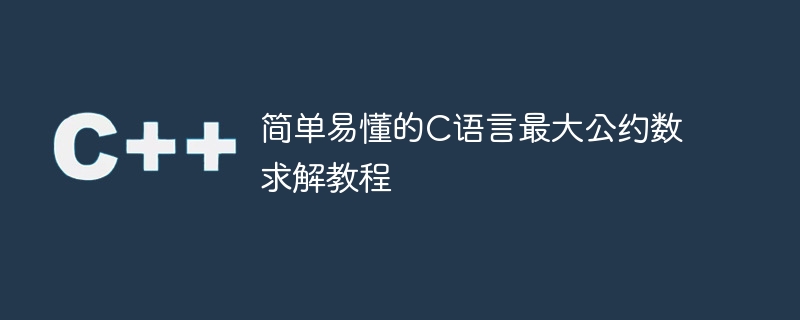Home >Backend Development >C++ >Simple and easy-to-understand tutorial on solving the greatest common divisor in C language
Simple and easy-to-understand tutorial on solving the greatest common divisor in C language
- WBOYWBOYWBOYWBOYWBOYWBOYWBOYWBOYWBOYWBOYWBOYWBOYWBOriginal
- 2024-02-20 19:12:03926browse

Simple and easy-to-understand tutorial on solving the greatest common divisor in C language
1. Introduction
In mathematics, the Greatest Common Divisor (GCD) It refers to the largest positive integer that can divide two or more integers. Finding the greatest common divisor is very common in programming and can be used to simplify fractions, proportions, and integer operations. This article will introduce how to use C language to write a simple greatest common divisor solving program, including specific code examples.
2. Algorithm Analysis
This tutorial will use the euclidean division method to solve the greatest common divisor. The basic idea is: two positive integers a and b (a>b), if a can divide b, then b is the greatest common divisor of the two; otherwise, find the remainder of the two divisors and use the remainder as the new dividend. , the original dividend becomes the divisor, and the remainder is calculated again. Repeat this process until the remainder is 0, at which point the original divisor is the greatest common divisor.
3. Code implementation
The following is an example code of a simple greatest common divisor solver program in C language:
#include <stdio.h>
// 函数声明
int gcd(int a, int b);
int main() {
int a, b;
printf("请输入两个正整数:");
scanf("%d %d", &a, &b);
int result = gcd(a, b);
printf("最大公约数是:%d
", result);
return 0;
}
// 函数定义
int gcd(int a, int b) {
if (a < b) {
int temp = a;
a = b;
b = temp;
}
while (b != 0) {
int temp = a % b;
a = b;
b = temp;
}
return a;
}4. Code analysis
- First of all , we include the stdio.h header file in the program to use the input and output functions. Then, we declare a function called gcd to find the greatest common divisor.
- In the main function, we first define two integer variables a and b. The user can set the values of these two variables through input.
- Then, we call the gcd function, passing a and b as parameters to get the greatest common divisor.
- Finally, we print out the greatest common divisor and end the program.
- In the gcd function, we first determine whether a is less than b, and if so, exchange the values of the two variables to ensure that a is always greater than b.
- Then, we use a while loop to perform the calculation of euclidean division. Each calculation assigns the divisor (b) to the remainder (temp), assigns the remainder to the divisor, and repeats this process until the remainder is 0.
- Finally, we return the greatest common divisor (the divisor when the remainder is 0) to the caller.
5. Usage Example
Suppose we need to solve the greatest common divisor of 40 and 64. We can use the above program by following the following steps:
- Compile and run the program .
- In the command line window, enter two positive integers 40 and 64 as prompted.
- The program will output the greatest common divisor 24.
6. Summary
This tutorial introduces in detail how to use C language to write a simple and easy-to-understand greatest common divisor solving program. By using the euclidean method, we can easily find the greatest common divisor of any two positive integers. I hope this article will be helpful to readers who want to learn or use C language to solve the greatest common divisor.
The above is the detailed content of Simple and easy-to-understand tutorial on solving the greatest common divisor in C language. For more information, please follow other related articles on the PHP Chinese website!
Related articles
See more- How to find the greatest common divisor and least common multiple in PHP
- How to express not equal in C language?
- What does '&&' mean in C language?
- Does the greatest common divisor of any subset of the array belong to the given array?
- Program written in C language to calculate the greatest common divisor

